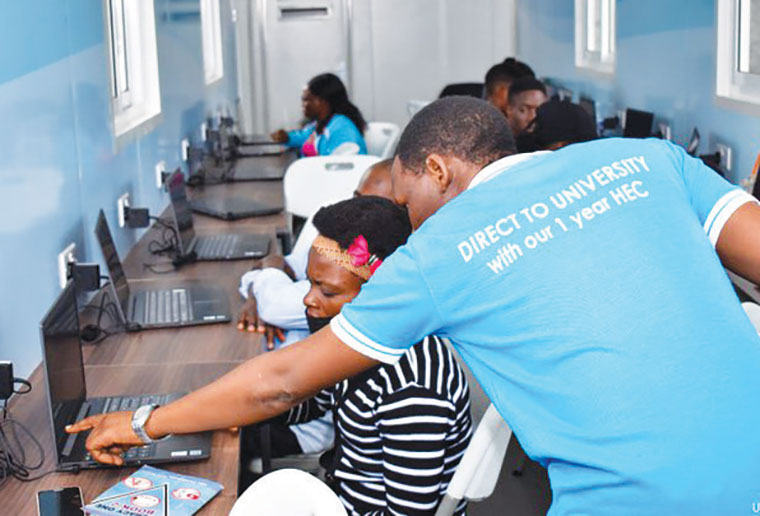In a move signaling a new era in Uganda’s commitment to digital innovation and youth empowerment, the Government of Uganda, through the Ministry of ICT and National Guidance, designed the National ICT Initiatives Support Programme (NIISP) to facilitate the creation of an ICT innovation ecosystem and marketplace for Ugandan innovative digital products.
The NIISP tackles bottlenecks to creating a digital ecosystem by promoting the development and deployment of applications to create an open ecosystem in Uganda that shall enable the government, companies and individuals to innovate and reach new markets.
The ministry, therefore, started the National ICT Innovation Hub Uganda at the Institute of Information and Communications Technology (UICT) Nakawa campus in 2019. However, the hub was revamped and redesigned to make not just a center for technological innovation, but to also serve as a fertile ground for nurturing the talents of Uganda’s young innovators and entrepreneurs.
With state-of-the-art facilities and an environment conducive to creativity and collaboration, the innovation hub is poised to become a key player in driving the country’s digital economy forward.
ADDRESSING YOUTH UNEMPLOYMENT
During the launch of the newly transformed hub in January this year, the state minister for ICT, Hon. Joyce Nabbosa Ssebugwawo, in her address, emphasized the critical role of the innovation hub in addressing the nation’s youth unemployment crisis.
“In Uganda, we face a daunting challenge with over 9.3 million young people disengaged from the workforce,” she noted, adding, “The National Innovation Hub is our answer to this challenge. It is here that we will cultivate the skills, ideas and innovations that will not only create jobs but also propel our nation into a new era of technological advancement.”
Echoing the minister’s sentiments, Dr. Aminah Zawedde, the permanent secretary at the Ministry of ICT and National Guidance, shed light on the transformative impact of the hub’s renovation.
“This is more than just a facelift. It is a strategic reimagining of how we engage and support our youth. Since the revamp, we have seen an increase of over 190 percent in youth- led enterprises and innovators utilizing the hub. This surge in engagement is a clear indication of the hub’s vital role in empowering the next generation of digital leaders in Uganda.”
In addition to serving as a center for innovation, the hub has also become a vibrant community space, hosting 2,825 events, 751 business meetings and empowering 6,531 individuals through digital skilling, capacity building and mentorship programmes. These activities are not just numbers, they are a testament to the hub’s role as a catalyst for change and a driver of economic development.
Innovators and entrepreneurs interested in utilizing the National ICT Innovation Hub can do so by visiting its website at
REGIONAL ICT INNOVATION HUBS
In the financial year 2021/22, the ministry provided support to three public universities for establishing regional ICT innovation hubs; namely, Muni University for the West Nile sub-region, Soroti University for the Eastern region and Kabale University for the Southwestern sub-region.
The support covered the tooling of the innovation hubs in these universities with ICT equipment, software and furniture. More regional universities will be supported in the subsequent financial years, subject to the availability of funds.
On March 20, 2024, the ministry, through NIISP, launched the Soroti University ICT Innovation Hub to facilitate the growth of an ICT innovation ecosystem and marketplace for Ugandan innovative digital products. The Soroti University ICT Innovation Hub will equip the youth with innovation space, digital skills and connectivity as well as promote access to and availability of affordable ICT solutions for the local communities and the public, and export these ideas to foreign missions.
During the launch of the hub at Soroti University, Dr Zawedde revealed that in the financial year 2021-2022, the ministry provided funds amounting to Shs 750 million for the establishment of the regional ICT innovation hubs in the universities of Soroti, Kabale and Muni, with each receiving Shs 250 million.
This would not only increase the uptake of ICTs in higher institutions of learning but among the business community and other professional service providers, let alone increase job creation for the local community.
Dr Zawedde added that the ICT Innovation Hub will create solutions as per the digital transformation roadmap that addresses the lack of opportunities and challenges currently facing the youth, the majority yet the most vulnerable group in Uganda. Dr Chris Baryomunsi, the minister of ICT and National Guidance, said the Soroti University ICT Innovation Hub provides the government with a unique opportunity to address a critical gap in linking digital skills training with job creation.
“The innovation hub is not all about generating ideas but ensuring that these ideas have been turned into realities that have the power to make a difference in society. This hub will serve as a launch pad for innovation-driven entrepreneurship,” he said.
INNOVATORS AT THE NATIONAL ICT INNOVATION HUB
Local start-up companies currently operating from the National ICT Innovation Hub are: Technology Innovators Students Association (TISA), Microfuse Computer Technologies, CIT2 Technologies, Sumic Online, Kacyber Technologies, SMS One (U) Limited, Code Impact, Rideline, Info Consults, Askari/Ngaro Project, Uzazi Hub, Auto Fore, Questlyft, IoTEC, Uriel LTD, Alipata, RentBeta, Omugundu gwa Tech, PesaSmart Digital Financial Literacy Money Game, Kwetu Auctions and Realty, eRyte Museum of Technology (eMoT), Wacloud, Mpungu Analytics, Wal-e Visual, Cross roads, Streamline Education Media, CBM Brothers, Cawine, Kollaborate, Cognosphere Dynamics Limited, Mindlyfe Limited, Afya Hub, Market Uganda, Ever Pesa Technologies, Innerspark, Tubayo, Real VR, Sauti Marketing, and National Online Mentorship System.
FOUNDER APPLICATIONS UTILIZED BY GOVERNMENT
The following are ICT systems which have been developed by local innovators with support from the Ministry of ICT’s NIISP being used being by government entities to deliver services to citizens:
Parish Development Management Information System (PDMIS); a system which is used to collect parish data across Uganda and is being used by all partnering institutions to track all Parish Development Model data.
ePosta; a Post Office Information Management System that has revolutionized the Post Office by enabling Post Office offer all its services online.
Education Management Information System (EMIS), which provides timely statistics and information for policy development, planning, budgeting and evidence-based management practices in Uganda’s Education and Sports sector.
Electronic Government Procurement (eGP); is a single channel, portal and point of access for Uganda procuring entities, allowing to negotiate better contract terms and to realize savings and achieve value for money.
GovNet; an ICT company which provides various innovative and high-quality e-Government solutions in the business, finance and communication domains such as defining roadmaps, change management, coordination, monitoring, quality assurance and technological and end-user support of operational systems.
Info Consults; a consultancy company which partners with institutions that seek to enhance the means by which considerable volumes of documents that have been created and maintained largely for their administrative, historical, evidential and legal value are stored and retrieved.
jjingoernest1@gmail.com




